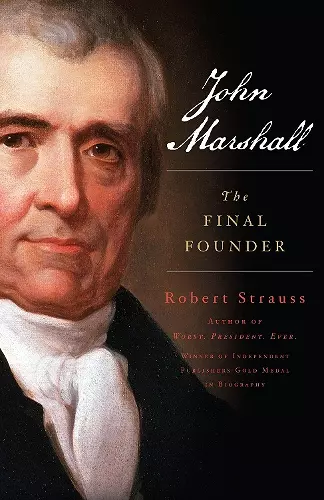John Marshall
The Final Founder
Format:Paperback
Publisher:Rowman & Littlefield
Published:5th May '25
£17.99
Supplier delay - available to order, but may not be available until after 5th May 2026.
This paperback is available in another edition too:
- Hardback£19.99(9781493037476)

Eighteenth- and 19th-century contemporaries believed Marshall to be, if not the equal of George Washington and Benjamin Franklin, at least very close to that pantheon.
John Marshall: The Final Founder demonstrates that not only can Marshall be considered one of those Founding Fathers, but that what he did as the Chief Justice was not just significant, but the glue that held the union together after the original founding days. The Supreme Court met in the basement of the new Capitol building in Washington when Marshall took over, which is just about what the executive and legislative branches thought of the judiciary.
John Marshall: The Final Founder advocates a change in the view of when the “founding” of the United States ended. That has long been thought of in one or the other of the signing of the Constitution, the acceptance of the Bill of Rights or the beginning of the Washington presidency. The Final Founder pushes that forward to the peaceful change of power from Federalist to Democrat-Republican and, especially, Marshall’s singular achievement -- to move the Court from the basement and truly make it Supreme.
"Entertaining historical tidbits within a fine short biography."
"Active until late in the Andrew Jackson administration, John Marshall (1755-1835) was the last of his generation still in high office. The only founder who outlived him, James Madison, was long retired. Son of a small Virginia landowner, Marshall served several years in the Continental Army during the Revolution. After studying law, he became an influential figure in the conservative Tidewater establishment and a Federalist. Together with Madison, he worked hard to persuade Virginia to ratify the Constitution, which it did, narrowly. George Washington offered him several jobs in his administration, but he declined. He traveled to France on a diplomatic mission under John Adams, who appointed him secretary of state in 1800 and then chief justice in 1801, two months before leaving office. This annoyed the incoming president, Thomas Jefferson (already an enemy); at the time, however, the Supreme Court was not a powerful body, so he didn’t make an issue of it. Despite exceptions such as Stephen Budiansky’s Oliver Wendell Holmes (2019), biographies of judges rarely make for gripping reading. Though not on that level, journalist and historian Strauss’ interpretation is solid, stressing that Marshall’s vigorous leadership elevated the court to a co-equal branch of government and gave it the power (not mentioned in the Constitution) to invalidate state and federal laws. The author examines Marshall’s landmark legal accomplishments, but he also digresses into sections on a host of intriguing historical ideas. After mentioning that Marshall was considered a potential presidential candidate, Strauss inserts a long chapter describing a dozen Americans who yearned to be president but failed—e.g., Henry Clay, William Seward, William Jennings Bryan, Adlai Stevenson. At his death, Marshall became a mythical figure. Strauss devotes a chapter to other leaders who attained mythical status, from Washington to Kennedy. Readers concerned with the present makeup of the court may be reassured to learn about the worst justices of the past."-Kirkus
ISBN: 9781493071890
Dimensions: 237mm x 164mm x 26mm
Weight: 558g
280 pages